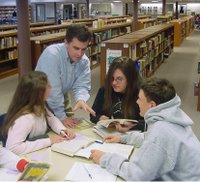The new fear - blogging anonymously
The Houston Chronicle recently published an interesting article recently on teachers using blogs to get their voices heard, which, according to the article, is basically to anonymously vent their frustration about their jobs. Essentially what we have is a typical journalistic dispatch detailing the latest, scariest new technology. In this case, it's teachers blogging. Little did I know that we teacher/bloggers are encountering a whole new world of potential pitfalls as we use our sites to discuss our poorly-run schools and to lash out at our students - all anonymously of course.
The blogs of two of my favorite and very un-anonymous bloggers, Bud Hunt and Victoria Davis, were both mentioned as examples of teachers hiding behind pseudonyms. In fact, the reporter authoritatively announces, "[i]n the Cyber world, these chatty, often frustrated, teachers pour their thoughts out under screen names like 'Bud the Teacher,' 'Hip Teacher' and 'Cool Cat Teacher.'" Yikes. Bud, always thoughtful and insightful, has posted his thoughts about the issue, including some of his correspondence with the reporter. I agree with Bud about blogging anonymously. It's too easy to be irresponsible, which can undermine all the great ideas that bloggers like Bud bring to the blogosphere.
What gets me about articles like this is how easy it is to spread misinformation, which also subtly undermines what we do. (disclaimer: I do not purport to be on the same level as folks like Bud and Victoria, but I didn't want to use a third person pronoun. Too distant sounding) The general tone seems to be that with these new technologies comes a need for great alarm and pause. I point to a throwaway paragraph near the end: "Most Houston-area districts have remained silent on the issue of what teachers may post on their blogs, although the Katy school district issued a stern warning to employees last fall after some expressed concern about educators and students chatting online." First of all, I would hope that if any school begins to draft guidelines on blogging they consult Bud's excellent wiki resource on the topic. And second, I hope they will learn the difference between "chatting online" and blogging.





 Now I want to take a page from
Now I want to take a page from 




